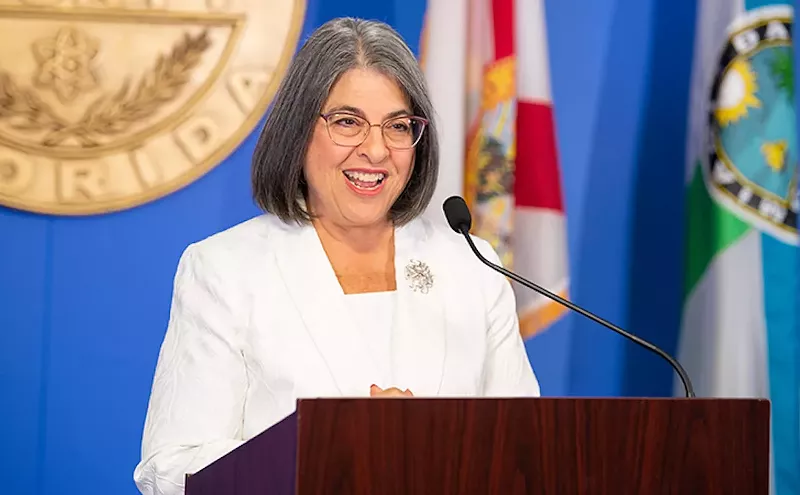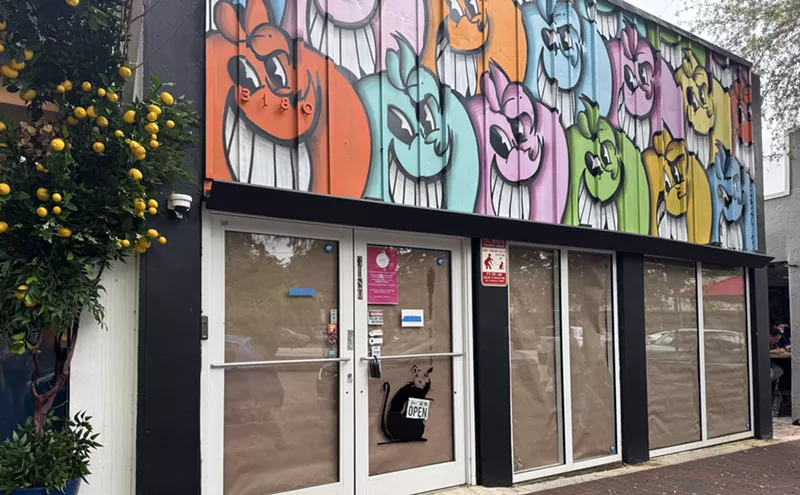Sevcec, dressed in an elegant navy suit with heavily padded shoulders, pauses briefly. A wave of white hair, sprayed into an immobile shock, lies over his forehead. A heavy layer of foundation lends a pink hue to his face. The host of Sevcec, one of Telemundo Network's top-rated television shows, will soon begin taping today's programs -- "My Son Is a Gang Member" and "I'm Pregnant and I Don't Know What to Do" -- but first he must read more promotions for upcoming segments.
The fifteen-second spots, called "1-800-Billboards," will find homes in Telemundo's morning lineup and on future episodes of Sevcec, whose primarily female viewership stretches across the United States and twelve other countries. At the bottom of the screen a toll-free number will flash like a baited hook for the desperate, the vengeful, and the vainglorious.
And they will bite. Negligent mothers. Mud wrestlers. Abused children. Hypnotists. People whose marriages are in ruin. Women jealous of their mothers. Rock stars promoting new videos. Women who are really men. Girls who don't like their stepfathers.
Sevcec continues in the same steady tone: "Three, two, one ... Are you despairing because you participated in a Syms commercial and suddenly [dramatic pause] everyone is laughing at you?" He stops and lets loose a high-pitched chortle. After a moment's confusion, the production crew dissolves into laughter. Even segment producer Adela Maruri smiles. She's the butt of his joke, having once appeared in a Syms ad. (Sevcec delights in playing pranks and practical jokes on his colleagues. His favorite seems to be the surprise scare). The audience slowly catches on and titters. But already, Sevcec is back on track: "Senora, Senor, do you think your children don't love you? Are you in pain? Are you anguished? Come and talk with us," he purrs.
The 43-year-old Sevcec is clearly having a blast, and why not? For the past four years, a steady stream of guests has come to air grievances and bare conflicts on a program that often resembles group therapy, hosted by a man some call the Latin Phil Donahue.
He's come a long way since his first job as a radio sportscaster in Uruguay some twenty years ago. Now he's one of the fastest-rising Hispanic media stars in the United States. And though some journalists may say he sold his soul and sacrificed more than a few personal relationships along the way, their voices are drowned by an eager industry and a growing audience happy to share their lives with him.
Today, the six-foot-three talk-show host is still animated from a recent visit to New York City and the unveiling of Telemundo's new fall lineup -- which seems to consist entirely of Spanish versions of old Anglo shows such as Charlie's Angels. "If you turned off the sound, it could be NBC," marvels Sevcec. The event received heavy media attention, not so much for the refried television as for a chance to get to know the new network owner -- Sony, the Japanese media conglomerate that, along with Liberty Media, announced last November the purchase (pending FCC approval) of Telemundo for $539 million. The new parent has promised to invest heavily in Telemundo's uphill battle for supremacy against Univision, its only competitor. Telemundo currently has an anemic seventeen percent of the Spanish-speaking U.S. market. The prize at stake: an estimated 8.4 million Hispanic households, the fastest-growing viewing population in the country.
As if being the first male to host a Spanish-language TV talk show in the United States weren't enough, Sevcec is also the star player in a bold venture that is trying to accomplish what many previously thought impossible: uniting the nation's Hispanics by radio. Monday through Friday, from 9:00 a.m. to noon, he hosts Sevcec Live, a current-affairs program for Radio Unica, the first Spanish-language talk-radio network in this country. Fueled by exclusive radio rights to the biggest sports tournament on the planet -- soccer's World Cup -- Radio Unica already has more than 60 affiliates after only seven months of operation.
Suddenly Sevcec is everywhere -- on the radio, as a BellSouth spokesman for the Yellow Pages, in public service announcements against urban ills such as teen violence. In addition to Sevcec, he hosts a Monday talk show seen only in Miami. His face is as familiar to Hispanics as it is unknown to Anglos. The amiable celebrity seems to be living a fairy-tale success story that would be right at home on one of his shows. Like any good Sevcec segment, his story froths with drama, passion, and a few tears. Consider the possible titles: "Serious Journalists Who Become Talk-Show Hosts." "Men Who Change Women When They Change Jobs." "My Love Life in the Public Eye."
Indeed, in the third instance, the cameras have already rolled. "Thank you for allowing us into your house under these special circumstances," says the always polite host. Seated beside him on a couch surrounded by floral arrangements is the fetching Raquelin Gonzalez, a 29-year-old Mexican native and the star of Telemundo's only musical variety program, Padrissimo. "You are going to see our wedding," says Sevcec, beaming proudly. "You are going to share our wedding, and I want to officially present my wife, Raquelin Gonzalez de Sevcec."
Yes, welcome to the Reynosa, Mexico, wedding of Pedro and Raquelin, a well-edited home video that was broadcast in prime time a few days before Valentine's Day 1997. The hourlong special featured Gonzalez having her makeup applied, Sevcec wearing latex dog ears as he dances at the reception, a European and Middle Eastern honeymoon, and Sevcec shaving his signature beard. One of his producers will later joke about plans for a show when the two conceive their first child: the visit to the gynecologist, the morning sickness, the cutting of the umbilical cord.
While no one has ever doubted Sevcec's talent or versatility, few could have predicted his rise to the status of pop idol. The great-grandson of Eastern European immigrants, he was born in 1954 in Montevideo, Uruguay. Sevcec was just fourteen when his mother died. After butting heads with his father for two years, he struck out on his own. "I left a heroic note [along the lines of] 'I'll show you,'" he remembers with a laugh. "But it went badly, very badly." Sleeping in public parks and at friends' houses, he spent most of his time searching for his next meal and trying to keep his one extra shirt clean. "It was very difficult to stay presentable," he recalls as he sits in a cramped office at Telemundo flanked by a row of obviously expensive suits.
By eighteen he had reconciled with his father and returned home. A year later the military took control of the country in a coup that would inaugurate an eleven-year dictatorship. Analysts estimate that during the army's reign, Uruguay had the world's highest proportion of political prisoners relative to the population. Sevcec, however, stayed on the right side of the political fence and cultivated a conservative ideology, espousing a repugnance for the communism that swept through high schools and universities in Latin America at the time. (His anti-communist credentials have served him well in Miami's Cuban-American community, says one of his producers).
Though he had little formal training, the gregarious young Sevcec found work as a sportscaster for a local radio station. He juggled that job with stints as a commentator on television and a reporter at an afternoon paper, Mundocolor, owned by the nation's leading daily, El Pais. The army, working behind the facade of a civilian president, held a firm grip on the information that journalists reported, but Sevcec excelled in one of the few areas in which reporters were allowed to work freely: economics. He began writing about the Latin American debt crisis and spiraling inflation. "He has a very open mind for news stories," says a former colleague and a current editor at El Pais, Daniel Rodriguez. "Talking about the economy is not very interesting, but he always knew what [stories] interested the public."
When Rodriguez fell ill just before he was supposed to go to war-torn El Salvador in 1982, the 28-year-old Sevcec suddenly found himself on assignment, covering elections that leftist guerrillas had threatened to disrupt. Days before, three members of a Dutch television crew had been killed as they tried to gain access to a guerrilla stronghold. (Foreign journalists in the country at the time blame an army ambush for the deaths.) The day after arriving in San Salvador, Sevcec met a Chilean television crew at the Sheraton Hotel. He had hired a taxi to observe the polling the following morning and offered to share it with his colleagues.
In a suburb outside the capital, the group got caught in a firefight between the army and guerrillas. As Chilean cameraman Carlos Ruz leaned out of the back seat to film the battle, a bullet hit him in the neck. "There was an explosion of blood as his artery was sliced," recalls Sevcec, who was in the front seat of the cab. "I thought we were going to die." More than fifteen years later, this horrific memory is very much alive. He leapt from the car. "I was running, but it felt like I wasn't going anywhere." He threw himself into a garbage-strewn ravine, injuring his knee.
Soldiers nearby ushered him to the safety of a small shack. As the frightened reporter tried to control his racing heart, one of them shouted, "Come see who killed your friend!" There on the ground lay a wounded guerrilla. "He was shaking like a fish out of water," Sevcec relates. A moment later, the soldier shot the man point-blank in the head.
The soldiers later took Sevcec to a hotel where foreign journalists maintained offices, and he immediately sat down to send photos and material for a story back to Uruguay. He told the Associated Press that he was certain leftist insurgents had shot Ruz, who died days later from his wounds. Though he didn't know it at the time, El Salvador was just the first of many war zones he would visit. The guerrilla and the cameraman were the first of many deaths he would write about. His professional obligations fulfilled, he returned to his hotel and collapsed.
Not long after he returned home, Sevcec won a U.S. State Department-sponsored trip to the United States as part of an educational tour for Latin journalists. "I was dazzled," he recalls "because in this country, one's limit is determined by one's capacity." The United States began to look even better when he discovered that currency devaluation in Uruguay during his absence had dropped his salary from $2000 a month to $800.
Enamored of the United States, he came to Miami with nothing more than the promise of a job audition with the Spanish International Network, or SIN, a precursor to Univision. He won the position and soon became SIN's Central American bureau chief, based in San Salvador. From there he covered war and earthquakes throughout the region. "I've seen some terrible things," he says, "like flies coming out of dead men's mouths as children play around the corpses." As he speaks, he has just finished taping a new segment, "My Partner Wants a Divorce."
In 1986 Jacobo Zabludovsky, an anchor for the Mexican network Televisa, which had ties to Mexico's ruling party PRI announced he would be the director of SIN's news division. SIN's news staff, including Sevcec, resigned in protest. The network, they charged, would become a propaganda tool for the PRI. The journalists formed their own news team, Hispanic-American Broadcasting, or HAB, and found a major client in Telemundo Network. But not all was well in the Sevcec household; in 1987 he and his Uruguayan wife divorced. It was not the last time that a career change would include a change of partner.
In the pond-size but turbulent waters of U.S. broadcasting to Hispanics, most veterans have worked in all the media outlets at one time or another. Sevcec is no exception. In 1988 Telemundo dumped the HAB reporters, opting instead to receive its news from CNN.
Sevcec moved from television to print journalism, El Nuevo Herald, where he worked until 1993, first as a reporter covering stories such as the Panama invasion, Nicaraguan contras, and the collapse of the Berlin Wall, and later as a local-news editor. He says one of his proudest moments was his accurate prediction of the Sandinistas' electoral defeat in Nicaragua in 1990. During the same period, he did occasional work for Univision, then headed by an old friend of his, Chilean-born Joaquin Blaya, who had been an executive at SIN during Sevcec's tenure there.
In July 1987, a scant two months after Sevcec's wife granted him a divorce, he married Miami Herald reporter Liz Balmaseda, who six years later would win the Pulitzer Prize for commentary. The two became Miami's power media couple and then its most titillating, glamorous soap-opera duo when, six years later, Sevcec began an affair with Herald reporter Evelyn Larubbia. (Sevcec refuses to discuss the previous marriage).
Balmaseda discovered the affair and filed for divorce. In 1993 Sevcec returned to television. By now his friend Blaya was running Telemundo and offered Sevcec an anchor spot with the network's Ocurrio Asi news magazine program. By the following January, Sevcec and Balmaseda had parted ways in an acrimonious divorce. That same year, Blaya created Sevcec for his favorite employee. "He is one of those talents who can do everything in the medium," says Blaya. The timing was perfect, Sevcec acknowledges. He was ready for a change. "I've had my quota of [death]," he says today. "A drunk driver can kill me, a heart attack, or someone who doesn't like the program. But no more will I put myself in danger."
On this day the only violence Sevcec will encounter is found in the stories he elicits from three young gang members, Buddha, Playboy, and Gilbert, all trying hard to look tough as they sit on red chairs on the stage behind him. "Who is to blame for the existence of gangs?" asks our host. Gilbert's mother, also on the stage, gives a strong hint of who will be assigned the ultimate responsibility. Much of the drama of today's show will center around an eleven-year-old girl who wants to join a gang. Sevcec has already pointed out to his producers that the show's theme is "My Child Is in a Gang," not "My Child Wants to Be in a Gang." So she and her distraught parents will sit offstage through the boys' segment first. A security guard remains in the audience in case the father tries to throttle his daughter. Sevcec has also invited the obligatory therapist. Most Sevcec shows that concern relationships feature psychologists who provide sound-bite expertise. Marital difficulties are the bread and butter of Sevcec, as one producer says, and psychologists are always in demand.
It's often difficult to find people to fill the studio, since the show is taped at 4:00 p.m., when the able-bodied are at work, admits Madeline Sanchez, a Sevcec staffer. She relies primarily on four unpaid "people brokers" to organize groups of retired folks, who are then picked up by a Telemundo bus and taken to the studio. One such broker is Cuban American Estrella Mallea. "Whenever you see a bored old person, tell them to call Estrella," she advises. Mallea sits against a back wall of the studio, watching over her brood. There is a festive, familial air in the studio as audience members who know one another renew old acquaintances.
The shows are taped twice daily Tuesday through Thursday, and an audience can spend as much as six hours in the studio. Sometimes the same audience will attend as many as four shows a week. Audience brokering is common, and, in fact, Sevcec's main competition, Cristina -- which shares the same time slot on rival Univisión -- uses identical brokers. The result: The same cheers and faces of several hundred old ladies from Miami Beach are daily beamed across the planet. "I like the Sevcec show better than Cristina because it's shorter," confides one septuagenarian. "At least here they give us dinner between the shows. With Cristina, you don't get anything, and sometimes they keep us there for eight hours at a time!"
That's not the only difference between the two shows. Ask Amada Rodriguez, a 73-year-old Cuban American from Miami Beach who can't even remember how many times she has been in the audience of Sevcec, which she occasionally also watches at home. Rodriguez likes the excitement of live, on-stage conflict, which means she prefers the more racy Cristina. Her show often includes a good tussle or confessions of bizarre sexual proclivities. Sevcec, who says he has never been comfortable with these extremes, is criticized by some viewers as "Cristina Lite."
"What's off-limits are the gross-type shows," says Sevcec executive producer Marisara Martin. "It does good things for the ratings, but Pedro will never allow it."
The audience knows what it wants from Pedro, and if he did anything else they'd be disappointed, she adds. "The thing people like about Pedro is his good humor, his laughter. 'He seems like a nice guy,' they say."
But nice guys often finish last. Cuban-American Cristina Saralegui has had her show for nine years, garnering top ratings for Univisión and consistently beating Sevcec -- a fact that grates with him. "I don't like to be second, even less so when there are only two people. That's not second, that's last," he says. He hopes that plans by Sony to move him to an earlier time slot where he's not up against Cristina will change his ratings. From April 27 to May 22, an average of around 928,000 American households watched Cristina each afternoon while only about 325,000 homes tuned in to Sevcec.
"They have me steamrollered," Sevcec admits. Yet his show was Telemundo's most popular for the first three weeks of June. And that alone, he believes, vindicates his more civil, therapeutic approach. Still, the game rules are simple, Sevcec explains. If you take a poll and ask people what they consider important issues, they'll always pick something like education, immigration, and public safety. But if you put the education show opposite a show on transvestites, the transvestites will win the higher ratings every time.
"It's very painful," he concludes forlornly.
The dramatic pain that people want to see is on display today. Sevcec hits all the right notes. He elicits gasps from the audience when he nudges the teenage delinquents into confessing a litany of crimes: robbery, battery, gunplay.
"With your hand on your heart," he asks Playboy, using one of his stock phrases, "can you leave the gang?" By the end of the show, his strategy is clear. He is using the boys' lifestyles as object lessons. He will frighten the eleven-year-old so much that she can't possibly idealize the boys. And in fact, this is why her father has brought her. "I saw the phone number and called," he says after the show. "We were desperate, and I thought it would help."
Sevcec brings out the mother of a gang member and pleads with her to offer counsel to the girl. Instead she breaks into sobs, and the host holds out a tissue. The visiting therapist praises the father's tough-love stance and advises him to send his daughter to a shelter if the behavior gets too bad. And the piece de resistance: A community activist and former gang member speaks emotionally on the rewards of turning one's life around.
By the end of the show, gang member Buddha has expressed concern for his own out-of-wedlock children. The eleven-year-old has admitted that she just wants love and attention. The audience claps enthusiastically, even though, for most, this is not their first Sevcec. Maybe not even their first gang show. Producers estimate that in the past four years, there have been about twenty gang shows with titles such as "Romeo and Juliet in a Gang" and "Gangs Against Gangs."
Out in the corridor after the taping, Lupe Casares, the former gang member, is not entirely comfortable with what he's done. Casares, who has been on the show before, came this time to pitch a documentary he has made. But he has qualms about turning the thorny reality of gangs into entertainment. "You can't solve these kinds of issues here," he says. "They pretend to do it, and that's what I can't stand. It took years for the daughter to become like that. And then they have the expert quote from the textbook, even though everyone is different. It's superficial. They push for an instant solution, but it takes years. They're not going to get it in a 45-minute program." Ten feet away, the eleven-year-old girl flirts with gang member Gilbert.
Sevcec says he is most happy working as a journalist, which these days means working at Radio Unica. "On the radio, I'm a fish in water," he explains. He starts most days at the radio station, arriving shortly after 8:00 a.m. with a stack of newspapers. The studio has recently moved from a cavelike building sandwiched between an auto body shop and a garment factory in a grimy corner of Hialeah to a new office building in the Kroger Center. The move adds cachet to this first effort at a Hispanic radio network, which Sevcec's friend Joaquin Blaya created.
The ultimate indicator -- Arbitron ratings -- won't be available for the start-up network until the middle of this month, but the World Cup seems to be working wonders in adding 63 stations running their programming, a "gigantic network of affiliates," as Unica's staff loves to say.
"I don't want to sound like a used-car salesman," says Blaya, who nonetheless is the ultimate booster, "but I'm convinced we will do very well."
At the end of the day, back in TV-land, after the pregnant women "who don't know what to do" have shuffled off the stage and after Sevcec has stayed behind to pose for pictures with fans from the audience, he will wrap up a fourteen-hour workday. "We have done much that is light," he admits, but he always treats his guests respectfully. That and the variety of his work keep him occupied. But the man who as a child would ask for encyclopedias for Christmas insists: "In my soul I am a reporter.












